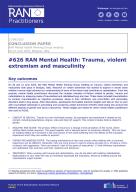Details
- Publication date
- 21 September 2023
- Author
- Directorate-General for Migration and Home Affairs
- Country
- Italy
- RAN Publications Topic
- Mental health issues
Description
On 20 and 21 June 2023, the RAN Mental Health Working Group meeting on trauma, violent extremism and masculinity took place in Bologna, Italy. Research on violent extremism has started to explore in recent years whether trauma might advance our understanding of some of the factors that contribute to radicalisation. From this premise, mental health practitioners discussed the complex interplay of factors related to gender, trauma and radicalisation by analysing cases of traumatised and radicalised boys and men. These cases included traumatisation by combat, traumatisation by migration processes, abuse in their childhood, and comorbidity with personality disorders and/or drug abuse. After discussions, participants formulated practical insights and tips on how to work with traumatised individuals in preventing and countering violent extremism (P/CVE) while taking into account the different aspects of gender and (toxic) masculinity. These insights are meant for other mental health practitioners who work in P/CVE.
- CONTEXT IS CRUCIAL: Trauma is a very individual process. Its expression and experience is related to the context, including expectations, stigma, roles and (lack of) support. This context includes factors related to gender.
- ISOLATED AND ALONE: The primary effect of trauma is a change in the perception of the world, where nothing feels certain anymore. This goes together with a deconstruction of someone’s identity. This can have an isolating effect as if someone is the only person in the world suffering from the effects of the traumatic experience which they are unable to express.
- COPING MECHANISMS DIFFER: The coping mechanisms of men and women when dealing with a traumatic experience can be different. Generally, men are more prone to react to shame and pain (e.g. of being a victim of abuse) with aggression. There are several ‘rules of the game of masculinity’ (1) that influence traumatised and radicalised men and boys and their reactions and behaviour.
- TREATMENT: When working with trauma and radicalisation, you do not start with treating radicalisation. Radicalisation is very often the way an individual expresses the trauma(s), hence by treating trauma the radicalisation might subside.
- TREATMENT OF MEN: Providing group therapy is an effective way to let men accept themselves as victims and the emotions related to that, to provide a place of belonging and to reconciliate the ideal and real image of the self. This will positively impact the self-esteem and proneness to violence and extremist ideas.

